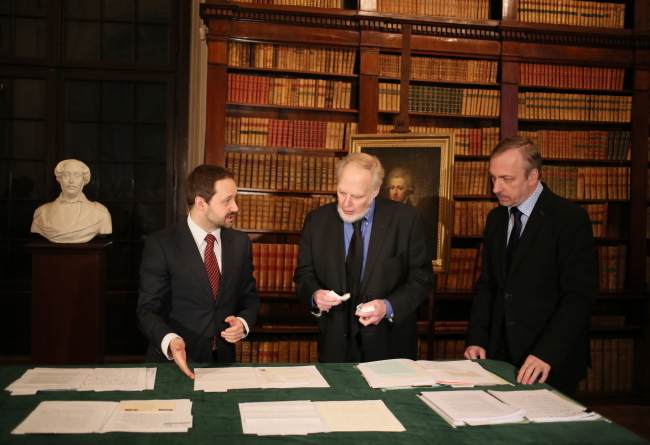
National Library director Tomasz Malowski (L), Antoni Milosz (C) and Minister of Culture Bogdan Zdrojewski (R): photo - PAP/Leszek Szymanski
Some 103 notebooks, filled with drafts of poems, letters and photographs make up the chief attraction of the collection.
“This is an extraordinary record of a dynamic and creative life, of the realised and unrealised ideas of a man who struggles with himself, creativity and existence,” enthused National Library director Tomasz Makowski, as cited by the Polish Press Agency (PAP).
Antoni Milosz, son of the late poet, reflected that the notebooks “could prove to be very useful for researchers.”
Minister of Culture Bogdan Zdrojewski noted that the sum paid to the poet's son is largely symbolic, as the items are worth a great deal more than the price paid.
“Actually, it's difficult to talk about a purchase, it is rather a form of compensation,” he said.
“The sum is approximately 400 thousand zloty [97,400 euro], which takes in the cost of transport and security, as well as archiving,” he added.
As part of the agreement, the National Library has also acquired the writer's 1980 Nobel medal, many personal documents, and about 10,000 volumes from the writer's library.
Czeslaw Milosz was born into a noble family in 1911 in lands that are now part of Lithuania.
Having flirted with communism after the Second World War, he defected to the West in 1951.
His 1953 book The Captive Mind (1953) endures as one of the most powerful critiques of the communist system.
Milosz taught for many years at the University of California, Berkeley, but returned to Poland after the fall of communism, settling in a flat in Krakow.
He died in 2004 and was entombed at Krakow's crypt of honour at the so-called Church on the Rock, alongside luminaries such as composer Karol Szymanowski and multi-talented artist and writer Stanislaw Wyspianski. (nh)